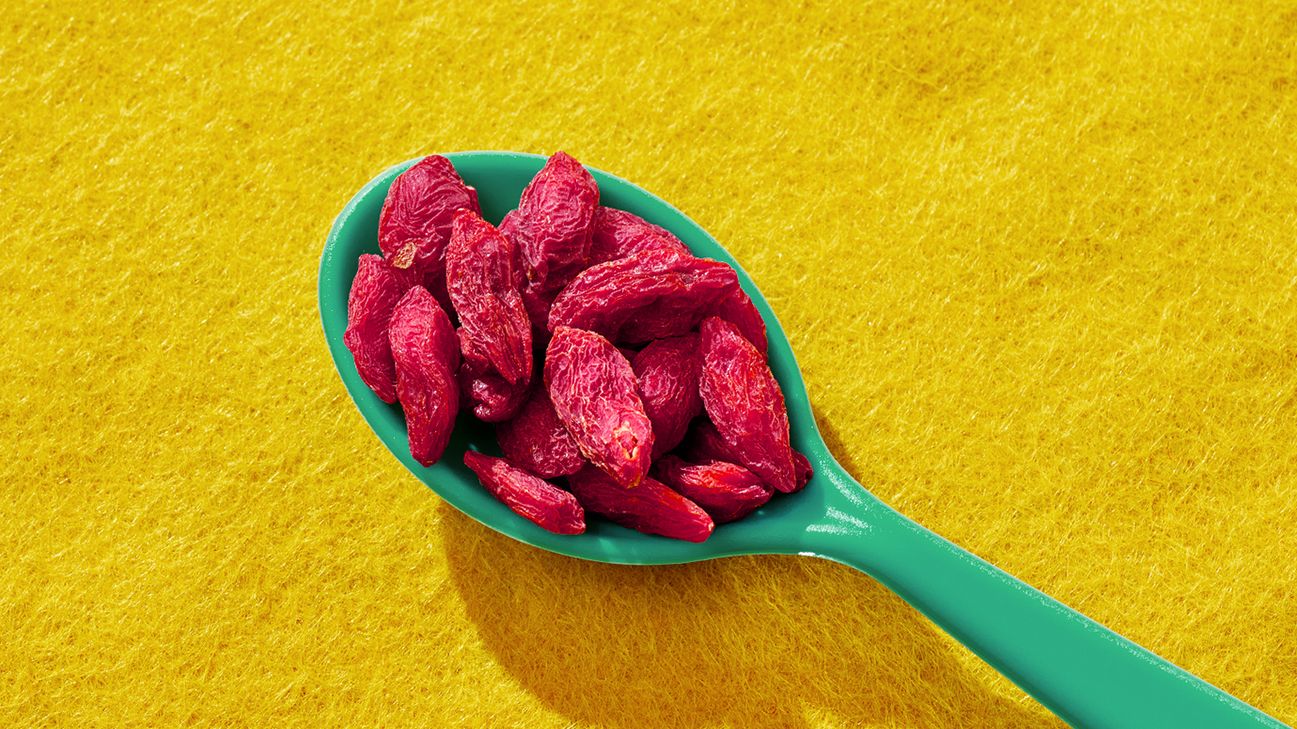We’ve all heard of raspberries, strawberries, blueberries, and even snozzberries, but get ready for the new berry star: goji berries. Also known as wolfberries or Lycium barbarum, goji berries are most commonly seen in their dried form, resembling small, reddish raisins.
In addition to being vibrant and full of flavor, goji berries have been linked to a long list of health benefits, proving that good things definitely do come in small packages.
Ready to start snacking? Keep reading for a full roundup of reasons to add these nutrient-rich rock stars to your next shopping list.

Not only are goji berries perfect for adding a pop of color to your plate, but they’re also packed with important nutrients. A single 1-ounce (28-gram) serving contains less than 100 calories, along with a whopping 4 grams of protein and 4 grams of fiber.
Plus, they contain a super concentrated amount of vitamin A and are jam-packed with other micronutrients, including vitamin C, iron, and calcium.
Here’s a closer look at the nutritional value of a 1-ounce (28-gram) serving:
| Calories | 98 |
| Protein | 4 grams (g) |
| Fat | 0.1 g |
| Carbohydrates | 22 g |
| Fiber | 4 g |
| Vitamin A | >100% Daily Value (DV) |
| Vitamin C | 15% DV |
| Iron | 11% DV |
| Calcium | 4% DV |
Goji berries are brimming with antioxidants to help you get smooth, glowing skin — no filter required. In particular, they’re rich in caffeic acid, chlorogenic acid, kaempferol, and coumaric acid.
They are also a good source of carotenoids, which have been shown to slow signs of aging by reducing wrinkles and boosting skin hydration and elasticity.
What’s more, goji berries might be able to protect your skin from sun damage to keep it healthy and smooth. In fact, one 2010 animal study suggests that consuming goji berry juice could provide protection from UV rays by reducing the inflammatory reaction of skin when it starts to get sunburned.
Although research in humans is still pretty scarce, some promising test-tube studies suggest that goji berries could help fight cancer cell growth.
In a 2016 study, goji berry extract was able to kill off breast cancer cells effectively. More impressively, it did this without harming any healthy cells.
Additionally, studies from 2009 and 2011 found that goji berries’ polysaccharides (a type of carbohydrates) could inhibit the growth of prostate cancer and colon cancer cells.
Whether you’re dealing with a full-blown flu or a case of the common cold, adding antioxidant-rich foods like goji berries to your diet can be beneficial.
According to some research in mice, goji berries could help reduce markers of inflammation. And they may even boost the effectiveness of the flu vaccine.
In a 2012 study, mice sick with the flu showed improved immune response when given a mixture of milk and goji berry juice. Doesn’t sound too tasty, but if it gets rid of the flu, why not?
Goji berries are also brimming with vitamin C, an important vitamin that doubles as an antioxidant to keep your immune system operating at full capacity.
Interestingly enough, some research suggests goji berries contain compounds that can improve your mood and rev up your energy levels.
For instance, a small 2008 study found that consuming goji berry juice for 14 days led to increased energy levels and improved athletic performance, quality of sleep, focus, digestive regularity, and mental sharpness — not to mention reduced stress and fatigue.
In a 2017 animal study, certain compounds extracted from goji berries helped protect against symptoms like anxiety and depression caused by the use of a medication often associated with changes in mood.
To round out the list of superpowers, gojis also contain melatonin, the hormone in charge of regulating your body’s time cues to ensure you’re catching enough Zzz’s every night.
Sounds like a pretty perfect food, right? Not so fast. It’s time for the big, fat “however.” There hasn’t been enough research to confirm that goji berries actually possess the magical properties described above. Most studies have been done on mice or with very small samples.
While goji berries are a great addition to any diet, they shouldn’t be considered a cure for any sickness.
Be careful when trying goji berries for the first time — a few instances of allergic reactions have been reported, and the berries can cause a harmful interaction with the drug warfarin, which is used to prevent blood clots.
Check with your doctor to make sure goji berries will play nice with any current medications. If you get the go-ahead, get started with gojis by snacking on a handful, adding them to trail mix, or trying out the recipes below.
Making goji berries a part of your on-the-go day
- 7 breakfast bowls to get you out of bed
- Think tahini is just for hummus? These 19 recipes will change your mind
- 5-ingredient smoothies that taste so good we want to cry
- 33 energy bites for on-the-go snacking
- 32 no-brainer chia seed pudding recipes
- 11 meal-prep recipes to make in your Instant Pot
- 21 healthier trail mixes to make yourself
- 9 healthy smoothie bowl recipes you’ll want to dive into
- 20 homemade granola recipes (that are actually healthy)
- 37 spinach smoothies that satisfy every craving

